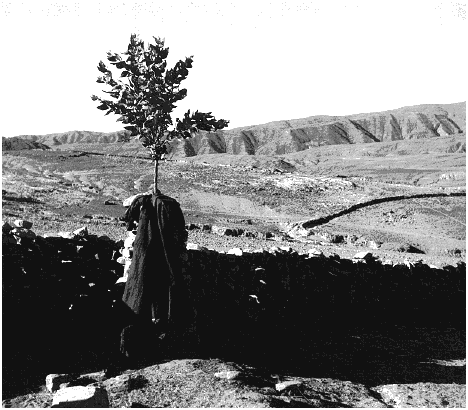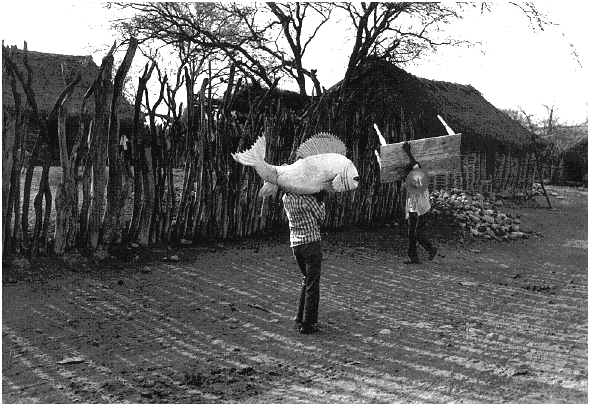No Flowers
You won't hear it nicely. If it hurts you, be glad of it. As near as you will ever get, you are inside the music; not only inside it, you are it; your body is no longer your shape and substance, it is the shape and substance of the music.

Vicente tells me he has twenty-five (or twenty-six) cousins. He invites me out to Valdeflores one Sunday to meet them. Valdeflores lies some thirty miles from Puerto Perdido but the roads there are so twisty and decrepit that it takes us a good hour and a half to get there in the truck, Vicente, me, and his brother Luis.
Valdeflores means "Valley of the Flowers" but I didn't see a single flower alongside the road we followed. What I did see was a seared landscape, a dried-up river --- shrunken to the width of your hand (this has been a fierce drought year) --- trees looking like they might in the midwinter in Vermont except for the fact that its 110 here in the shade.
Everything is covered with a pale yellow dust. O yes the dust --- there's dust everywhere: on the roofs of their shacks where the sharecroppers live, on the branches of the leafless trees, on the bare hot stones alongside the path that leads to the hill where the families live.
There's that self-same gritty yellow dust on the pants and shirts and bare feet of the cousins as they gather at the door to watch this old geeze in his wheelchair who has been pulled up along the twisting dust path into the kitchen, a strange visitor with pale skin and turquoise eyes come here from so far away perhaps, they think, from another planet.
I am put in mind of Mama Dip who grew up black and poor in North Carolina during the depression who once said that she and her family were so poor they didn't even know they were poor. I suspect these people here are so deprived they don't know the depths of it. If Walker Evans and James Agee were alive and working today, they would come along with me to not just to visit but to live with Vicente's four aunts and three uncles (the other two uncles have been abandoned to the world of mescal) and the twenty-five (or twenty-six) cousins some of the girls of whom at age fifteen or sixteen are already beginning to create the next Valdeflores generation in their flowering "panzas," their bellies.
The center of life is the kitchen. It has a rickety table where we sip at the warm sodas and where we take the tortillas that his Aunt Juana gives us and fill them with the salty mountain cheese we've brought with us, eating some of it, offering the rest to the many cousins crowded there all eyes at the door.
The tortillas are rolled by hand by Juana, a task she begins at five or so in the morning, not stopping until noon or so, a task she's been at daily for most of her lifetime --- a task that she doesn't see as a task but the stone of her days, a stone with which she rolls out the thin dough, a stone that has turned into an extension of her arm, the whole process taking up the entire morning --- soaking the hard dry kernels of maiz in their acid bath, grinding them, kneading the dough, rolling it out on the gray stone with a stone rolling-pin, white dough against the gray stone, the stone worn and featureless after so many years.
A worn and hard stone, in sharp contrast to her face which is filled with what we used to call "character" --- one of those faces that Evans would snap in the harshest of light to capture every line in it, the high cheekbones, the myriad lines radiating from eyes and mouth, the Zapotec nose --- Vicente has it too --- the nose like the nose on the Indian on the nickels we used to carry around in our pockets so long ago. Then, too, the straight back, the huge veined square-fingered hands, the coil of hair hanging over her right shoulder, the body that has not yet begun to sag under the tremendous pressure of caring for not only her own children but the children of her brothers and, soon enough, their children as well.
Evans would catch her in the harshest light, perhaps standing straight up before the grinding stone so that you would know that for Juana there was, is, and always be a lifetime over this stone the both of them worn by her daily output, the dozens of dozens of warm, fleshy tortillas --- tortillas, new, and fresh, that have the warmth of flesh. And when they cool, cool like flesh.
The tortillas of which these people are made, the tortillas of which we are now partaking, cooked briefly on the "comal" atop the fire, the firewood branches of the hocote tree, a special wood that burns slowly, that heats the already hot room to high furnace temperature, aided by the dark corrugated asbestos roof which captures the full power of the sun.
A slight breeze comes through the wall which consists of several dozen limbs hacked from trees with machetes, tamped into the ground to support the roof, space enough between for the hot air of the valley to leak through, stirring dust on the earthen floor, leaving us panting like animals in the zoo, all of us along with the dogs and even the chickens panting in the startling heat, all of us waiting there standing or sitting on the beaten floor, waiting, waiting...
If only Evans were here to record it...if only Agee were here to write about it --- in fine soul-wrenching detail, limning the construct of the shack, the warped, dark-wood table at which we sit for our spare lunch, the earthen floor below us stamped out by so many bare feet, the Oaxacan feet, those dusty, earth-muscled feet with the knotted toes, feet of those who have never known shoes, perhaps will never know shoes. Walker would have a field-day with the many different feet that we have here on display on this breathless afternoon.
On the way home I tell Vicente that we have to bring a camera next time. I want a record of his extended family with their black-on-
"People will be fascinated to know what it's like here," I tell him. "We can put together a book with photos, photos of all of your family." I think on the people of the Central Alabama hill country, from seventy years ago, and the book that made these famously poor people so famous, now newly famous for their hard beauty, for their huge hands and lined faces and bodies bent by endless work in the hard fields, under the hard sun.
Vicente thinks for a bit and then says, "Creo que no." I don't think so. He is not at all interested in me tromping out here with some fancy-dan camera to record the day-to-
"No lo quiero," he tells me. I don't like it. "A mí no me interés," he says. It doesn't interest him...at all. "Eres loco?" he asks. Are you mad?
